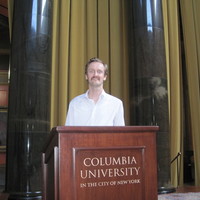Papers by Roberto Navarrete

Ágora. Papeles de Filosofía, 2021
El estudio ofrece una aproximación crítica a la concepción de la comunidad por Franz Rosenzwei... more El estudio ofrece una aproximación crítica a la concepción de la comunidad por Franz Rosenzweig en La estrella de la redención a partir de la antropología política de Helmuth Plessner. En primer lugar, se presenta la crítica de Plessner al radicalismo social, así como a la impoliticidad del espíritu alemán y su paralelismo con el espíritu judío. En segundo lugar, se estudia el paso de Hegel und der Staat a la Estrella a partir de la clave comunitaria. En tercer lugar, se estudia la diferencia entre comunidad de sangre y comunidad de fe en Rosenzweig, así como su traducción teológico-política en la distinción entre el pueblo eterno y los pueblos del mundo. Por último, a modo de conclusión, se pone de maniiesto la impoliticidad de la propuesta rosenzweiguiana, así como, por tanto, su incapacidad para dar una respuesta al problema político en Weimar, cuyas catastróicas consecuencias Rosenzweig no conoció.
Proceedings of the Internationale Rosenzweig Gesellschaft, Oct 20, 2014
XLVII Congreso de Filosofía Joven, 2010
Congresos, XLVII Congreso de Filosofía Joven. ...

Philosophy and Society, 31.4, 2020
This work offers a critical approach to Franz Rosenzweig's conception of community in The Star of... more This work offers a critical approach to Franz Rosenzweig's conception of community in The Star of Redemption based on Helmuth Plessner's political anthropology. First, it presents Plessner's critique of social radicalism and of the apoliticism of the German spirit, and its parallelism with the Jewish spirit. Second, it delves into the passage from Hegel und der Staat to The Star in a communitarian key. Third, it dwells on the difference between community of blood and community of faith in Rosenzweig, together with his theological-political translation into the distinction between the eternal people and the peoples of the world. Last, as a conclusion, it makes manifest the apoliticism of the Rosenzweigian proposal, and therefore, its incapacity to give an answer to the political problem in Weimar, of which its catastrophic consequences Rosenzweig did not know.
Revista de Filosofía, 2019
Resumen. El artículo analiza el vínculo entre derecho y violencia en Walter Benjamin y Franz Rose... more Resumen. El artículo analiza el vínculo entre derecho y violencia en Walter Benjamin y Franz Rosenzweig. Primero, se estudia la relación entre Benjamin, Rosenzweig y Carl Schmitt, y, a continuación, la proximidad entre las concepciones benjaminiana y rosenzweiguiana de la historia y de la temporalidad mesiánica, así como la relación entre justicia, derecho y eternidad. Finalmente, se presenta la propuesta derridiana de una deconstrucción de la crítica benjaminiana de la violencia y su antecedente en La estrella de la redención.
Palabras clave: Walter Benjamin; Franz Rosenzweig; derecho; violencia; Estado.
Bajo Palabra. Revista de Filosofía, 2018
El presente artículo esboza una genealogía del antisemitismo en la Europa de habla alemana. Su pu... more El presente artículo esboza una genealogía del antisemitismo en la Europa de habla alemana. Su punto de partida es una historia conceptual del concepto de secularización, desde su origen jurídico hasta su transformación en categoría filosófico- histórica, por medio de la cual se pondrá de manifiesto la relevancia del concepto hegeliano de mundanización (Verweltlichung) para comprender la especificidad de la relación entre judaísmo y germanidad. Por último, se presentan algunas consideraciones acerca del mito de la simbiosis judío-alemana (asimilación), el surgimiento del sionismo y la posibilidad de una des-asimilación judía.

Este artículo se ocupa del fenómeno contemporáneo de los " nuevos populismos y trata de esclarece... more Este artículo se ocupa del fenómeno contemporáneo de los " nuevos populismos y trata de esclarecer la lógica que comparten las correspon-dientes formaciones políticas. A tal fin, en primer lugar se exploran los orígenes históricos del populismo en los albores de la primera globalización. En segundo lugar, se analiza la confusión populista actual a partir de la contraposición de "ciudadano" y "súbdito" , así como del concepto de representación parlamentaria. Por último, se compara la tradición republicana de defensa de la política con la idiocia –en sentido griego– tanto del neoliberalismo como de los nuevos populismos y sus diversas manifestaciones.
This paper deals with the contemporary phenomenon which the concept " new populisms " refers to and examines the logic shared by the corresponding political formations. Firstly, I explore the historic origins of populism in the dawn of globalization. Secondly, the current populist confusion is analysed through the contrast between the figure of the citizen and that of the subject, as well as from the point of view of parliamentary representation. Lastly, I compare the republican defence of politics and the idiocy –in the Greek sense of the term– both of neoliberalism and of new populism and its many manifestations.

Éndoxa. Series Filosóficas., 2017
Resumen: El presente trabajo constituye una contribución a la biografía intelectual de Franz Rose... more Resumen: El presente trabajo constituye una contribución a la biografía intelectual de Franz Rosenzweig. Frente a la habitual división de su trayectoria espiritual, se establece un vínculo entre Hegel y el Estado (1914) y La estrella de la redención (1921) por medio de sus Escritos sobre la guerra (1917). Con este fin, se analiza la interpretación rosenzweiguiana de la Primera Guerra Mundial, en clave geopolítica, como el comienzo de un proceso de globalización del mundo. A partir de la crítica de Rosenzweig a la Realpolitik bismarckiana, se expone su concepción del mencionado proceso como camino cristiano hacia la redención y se la compara con la doctrina de los grandes espacios de Carl Schmitt. Por último, se presenta la solución de Rosenzweig al gnosticismo de Marción, a saber, su concepción relacional de judaísmo y cristianismo como agentes de la redención.
Abstract: This paper constitutes a contribution to Franz Rosenzweig’s intellectual biography. It aims to establish a connection between Hegel and the State (1914) and The Star of Redemption (1921) by means of Rosenzweig’s Writings on War (1917) and in contrast to the usual division of Rosenzweig’s intellectual development into two irreconcilable blocks. To this end, Rosenzweig’s geopolitical interpretation of the First World War as the beginning of a process of world globalization is presented. Taking as its starting point Rosenzweig’s critique of Bismarck’s Realpolitik, this process is expounded as the Christian path towards redemption and is compared to Carl Schmitt’s Großraum theory. Lastly, Rosenzweig’s solution to Marcion’s Gnosticism, namely his relational conception of Judaism and Christianity as mutually dependent redemptive agents, is briefly described.

Bajo Palabra. Revista de Filosofía, 2017
Resumen: El trabajo estudia la conformación de identidades colectivas a partir de la distinción e... more Resumen: El trabajo estudia la conformación de identidades colectivas a partir de la distinción entre historia y memoria. Tras presentar algunas consideraciones generales sobre el origen freudiano de la fenomenología de la cultura de Jan Assmann, su contribución es enmarcada en el contexto de la querella de los historiadores. Por último, las tesis de Assmann sobre la institucionalización de la memoria colectiva como memoria cultural son aplicadas al actual éxodo provocado por el fanatismo religioso.
Abstract: This paper deals with the configuration of collective identities according to Jan Assmann’s distinction between history and memory. After presenting some general reflections on the Freudian origins of Assmann’s phenomenology of culture, his contribution to a cultural theory is contextualized in the framework of the Historians’ Quarrel. Finally, Assmann’s thesis on the institutionalisation of collective memory as cultural memory are applied to the current exodus caused by religious fanaticism
Naharaim, 2016
Der vorliegende Aufsatz stellt einen bis dato unveröffentlichten Brief vor, den Franz Rosenzweig ... more Der vorliegende Aufsatz stellt einen bis dato unveröffentlichten Brief vor, den Franz Rosenzweig (1886–1929) seinem Vetter Rudolf Ehrenberg (1884–1969) schickte. Das Dokument, das aus einer vom jungen Hegel erzählten Geschichte der neueren Umwandlung der Gottesidee besteht, ist überaus bedeutsam, denn es wirft ein Licht auf Rosenzweigs intellektuelle Biografie und deckt eine Lebensstation des Autors des Sterns der Erlösung auf, in der er einen marcionitischen Standpunkt beziehungsweise eine Theologie der Weltentsagung verteidigte. Die Einleitung zeigt die Hauptquellen von Rosenzweigs Text auf und bezieht ihn auf die Auseinandersetzung mit Hegels Frühphilosophie in seinen jungen Jahren.

Das Ziel des vorliegenden Aufsatzes besteht darin, die Hegel'sche Abstammung bestimmter Aspekte d... more Das Ziel des vorliegenden Aufsatzes besteht darin, die Hegel'sche Abstammung bestimmter Aspekte des dritten Teils des Sterns der Erlösung Franz Rosenzweigs zu analysieren. Dazu verfahre ich im ersten Teil biografisch und versuche, den Wert von Hegel und der Staat im Leben seines Autors wieder-herzustellen. In diesem Sinne hinterfrage ich Nahum N. Glatzers Biografie von Rosenzweig sowie den Ausschluss der sogenannten " Gritli "-Briefe aus der von Edith Rosenzweig für ihre Veröffentlichung ausgewählten Korrespondenz ihres Ehemannes, in welchen die positivsten Äuβerungen Rosenzweigs zu seinem Hegelbuch zu finden sind. Im zweiten Teil berücksichtige ich die Wirkungsgeschichte von Hegel und der Staat im Rahmen der Hegel-Forschung vom Erscheinen des Werkes bis in die 1970er Jahre. Damit versuche ich zu beweisen, dass das Hegelbuch Rosenzweigs eine bedeutende Wirkung hatte, bevor die Rosenzweig-Experten dieses Werk zu untersuchen begannen. Auβerdem zeigt die Betrachtung dieser ersten Rezeption vom Hegelbuch Rosenzweigs, dass die in ihm dargestellte theologisch-politische Andeutung des Verhältnisses von Vernünftigkeit und Wirklichkeit bei Hegel immer eine wichtige Rolle spielte. Am Ende der Arbeit verbinde ich diese Andeutung mit dem christli-chen Weg zur Erlösung als Ergänzung des jüdischen noch-nicht-geschehenen Ereignisses der Versöhnung bei Rosenzweig. Damit wird beleuchtet, dass Rosenzweig und Hegel darin übereinstimmen, dass das Problem der Neuzeit in der Entzweiung besteht bzw. dass sie der gleichen Frage entgegentraten, und zwar aus sehr ähnlichen geistigen Entwicklungen, nämlich aus einer existenziellen Auseinandersetzung mit dem Gnostizismus.

El presente artículo tiene por objeto una elucidación del significado teológico-político de la co... more El presente artículo tiene por objeto una elucidación del significado teológico-político de la concepción relacional del tiempo tematizada por Franz Rosenzweig en La estrella de la redención, cuya singularidad quiere expresar aquí el concepto «diferencia mesiánica». Enmarcada en la querella de la secularización, esta temporalidad mesiánica representa una respuesta a la verificación de la articulación hegeliana de filosofía política y filosofía de la historia que, según Rosenzweig, tuvo lugar a través de la Primera Guerra Mundial. El consiguiente desengaño político sufrido por el autor de Hegel und der Staat condujo a éste a la búsqueda de un nuevo pensamiento cuya novedad viene dada por el primado ontológico del tiempo y por la indisoluble relación establecida por Rosenzweig entre «temporalidad» y «alteridad». Tomando como punto de partida la distinción Rosenzweiguiana entre «personalidad» y «sí-mismo», es decir, entre «ética» y «metaética», el final del trabajo explora los diversos modos en que se temporaliza el sí-mismo en función de sus relaciones con las temporalizaciones de Dios y mundo, así como sus correspondientes efectos de carácter teológico-político.
Palabras clave: diferencia mesiánica, Franz Rosenzweig, teología política, secularización.
This paper deals with an elucidation of the theologico-political implications of Franz Rosenzweig’s relational conception of time in his work The Star of Redemption, the peculiarity of which expresses the concept “messianic difference”. Considered from the standpoint of the secularization debate, this messianic temporality offers a response to the verification of the Hegelian assembly of political philosophy and philosophy of history which, according to Rosenzweig, First World War represented. The consequent political disappointment experienced by the author of Hegel und der Staatled him to the pursuit of a Neues Denkendetermined by the ontological primacy of time as well as the unbreakable relationship which Rosenzweig established between “temporality” and “otherness”. Taking as terminus a quothe anthropological distinction between “personality” and “self”, i. e. between “ethics” and “metaethics”, that Rosenzweig presents in The Star, I will finally attempt to explore the various modes of temporalization that, depending on the relation to the temporalization of God and the world, are possible for the Rosenzweigian Self, as well as their related theologico-political aftermaths.
Keywords: Franz Rosenzweig, messianic difference, political theology, secularization.

Este trabajo ofrece una historia de la recepción del pensamiento de Friedrich Nietzsche a partir ... more Este trabajo ofrece una historia de la recepción del pensamiento de Friedrich Nietzsche a partir del hecho histórico de su perversa utilización por parte del nacionalsocialismo. Se analiza, en primer lugar, el proceso de politización, germanización y nazificación del pensamiento de Nietzsche, facilitado por la mutilación de su obra que realizó la hermana del filósofo. Se describen, en segundo lugar, las diversas estrategias de despolitización y desnazificación del pensamiento y la obra nietzscheanos, aplicadas desde la misma década de los años treinta del siglo pasado. Se ofrece, en tercer lugar, un breve resumen sobre la cuestión «Nietzsche y el nacionalsocialismo».
This paper will offer a history of the reception of Friedrich Nietzsche’s thought from the fact of his perverse use by National Socialism. Firstly, the process of politization, germanization and nazification of his thought will be analysed, showing how this was facilitated through the mutilation of Nietzsche’s work done by his sister. Secondly, the various strategies implemented from the 30s to depoliticize and denazificate his thought and work will be described. Last, a brief summary about the topic «Nietzsche and National Socialism» will be presented.

El presente artículo ofrece una crítica de la interpretación decisionista de la doctrina de la so... more El presente artículo ofrece una crítica de la interpretación decisionista de la doctrina de la soberanía postulada por C. Schmitt en Teología política. Partiendo de la teoría de la secularización del jurista alemán, se mostrará que la capacidad de decisión sobre el estado de excepción definitoria del soberano schmittiano no es absoluta sino que permanece determinada por un orden concreto inmanente cuya representación es tarea del Estado. Así, se pondrá en cuestión la raigambre hobbesiana de la teología política schmittiana, deudora en mayor medida de la teoría hegeliana del Estado, y se presentará la razón jurídico-política de la desavenencia de Schmitt con el nacionalsocialismo.
This paper presents a critique of the decisionist interpretation of the concept of sovereignty which Carl Schmitt proposes in Political Theology.Starting from Schmitt’s theory of secularisation, I try to show that the capacity for decision on the state of exception which defines the Schmittian sovereign is not absolute but remains determined by an immanent concrete order that the State must represent. I question thereby the Hobbesian roots of Schmitt’s political theology, which rather is in debt with Hegel’s theory of the State, and I expose the juridic-political reason of Schmitt’s disagreement with National Socialism.

Abstract:
The aim of this paper is to clarify the meaning of Schmitt’s expression «political t... more Abstract:
The aim of this paper is to clarify the meaning of Schmitt’s expression «political theology» by discussing the homonymous Schmittian doctrine of sovereignty. I will evaluate, on the one hand, the theological (Peterson) and the scientific-philosophical (Blumenberg) critiques of Schmitt and, on the other hand, Schmitt’s answer to both critiques, which can be found in Political Theology II. I will try to prove that Schmitt’s theory of secularization, as it was proposed in 1922, does not imply a theologization of politics. On the contrary, this theory presupposes the death of God and, therefore, it states that secularity is intrinsic to Modern Age.
Key words: Peterson, Blumenberg, Schmitt, Modernity, Political Theology, Secularization.
Resumen:
El presente artículo trata de dilucidar el significado del sintagma «teología política» en el pensamiento de C. Schmitt conforme a lo postulado por éste en su homónima doctrina de la soberanía. Para ello se tendrán en cuenta las negaciones teológica (Peterson) y científico-filosófica (Blumenberg) de la propuesta schmittiana, así como la respuesta dada por Schmitt a ambas en Teología política II. Tratará de mostrarse así que la teoría schmittiana de la secularización, tal y como ésta fue postulada en 1922, no lleva a cabo una teologización de la política sino que, por el contrario, presupone la muerte de Dios y, en este sentido, afirma la secularidad intrínseca de la Modernidad.
Palabras clave: Peterson, Blumenberg, Schmitt, Modernidad, teología política, secularización.

El trabajo da cuenta de la génesis de la caracterización del Judesein a partir de su existencia m... more El trabajo da cuenta de la génesis de la caracterización del Judesein a partir de su existencia metahistórica y metapolítica, frente a la política mesiánica de los pueblos del mundo, en la Tercera Parte de La Estrella de la Redención de Franz Rosenzweig. La investigación parte del estudio rosenzweigiano sobre el origen y el desarrollo de la concepción hegeliana del Estado, Hegel und der Staat, así como de algunos escritos políticos de especial relevancia redactados por el pensador judeoalemán durante la Primera Guerra Mundial. Frente a la interpretación tradicional de la trayectoria vital e intelectual de Rosenzweig, proponemos aquí localizar las raíces de su judaización y de su comprensión de la especificidad del Dasein judío no sólo en su relación con E. Rosenstock-Huessy y H. Cohen, sino también en su experiencia del conflicto bélico y en su profundo desengaño de la conexión entre política e historia propia de la filosofía hegeliana y de la Ideengeschichte de F. Meinecke.
PALABRAS CLAVE: historicismo, historia, estado, metahistoria, metapolítica.
This paper deals with the genesis of the Third Part of Franz Rosenzweig’s Star of Redemption and his Judesein characterization from his metapolitical and metahistorical existence and as opposed to the Messianic Politics of the Peoples of the World. The starting point of the research will be the Rosenzweigian study of the origins and development of the Hegelian idea of State, Hegel und der Staat, as well as some relevant political writings which Rosenzweig wrote during the First World War. In spite of the traditional interpretation of Rosenzweig’s intellectual and vital course, we propose here to locate the roots of his judaization and his comprehension of Jewish Dasein specificity not only in his contacts with E. Rosenstock-Huessy and H. Cohen but also in his war experience and his deep disillusion about the connection between Politics and History which is at the very core of Hegelian philosophy and of F. Meinecke’s Ideengeschichte.
KEY WORDS: Historicism, History, State, Metahistory, Metapolitics.
El trabajo se ocupa del debate entre Hans Blumenberg y Karl Löwith a propósito de la relación ent... more El trabajo se ocupa del debate entre Hans Blumenberg y Karl Löwith a propósito de la relación entre secularización y filosofía de la historia. Se trata de ofrecer una alternativa a sus respectivas soluciones a partir de la distinción entre escatología y mesianismo tal y como esta puede rastrearse en los textos fundacionales del cristianismo.
Palabras clave: Secularización, escatología, mesianismo, filosofía de la historia, historicidad.
This paper deals with the discussion which Hans Blumenberg and Karl Löwith had on the relationship between Secularization and the Philosophy of History. We will try to offer an alternative
to their respective solutions taking as start-point the distinction between Eschatology and Messianism which can be found in the earliest texts of Christianity.
Keywords: Secularization, Messianism, Eschatology, Philosophy of History, Historicity.










Uploads
Papers by Roberto Navarrete
Palabras clave: Walter Benjamin; Franz Rosenzweig; derecho; violencia; Estado.
This paper deals with the contemporary phenomenon which the concept " new populisms " refers to and examines the logic shared by the corresponding political formations. Firstly, I explore the historic origins of populism in the dawn of globalization. Secondly, the current populist confusion is analysed through the contrast between the figure of the citizen and that of the subject, as well as from the point of view of parliamentary representation. Lastly, I compare the republican defence of politics and the idiocy –in the Greek sense of the term– both of neoliberalism and of new populism and its many manifestations.
Abstract: This paper constitutes a contribution to Franz Rosenzweig’s intellectual biography. It aims to establish a connection between Hegel and the State (1914) and The Star of Redemption (1921) by means of Rosenzweig’s Writings on War (1917) and in contrast to the usual division of Rosenzweig’s intellectual development into two irreconcilable blocks. To this end, Rosenzweig’s geopolitical interpretation of the First World War as the beginning of a process of world globalization is presented. Taking as its starting point Rosenzweig’s critique of Bismarck’s Realpolitik, this process is expounded as the Christian path towards redemption and is compared to Carl Schmitt’s Großraum theory. Lastly, Rosenzweig’s solution to Marcion’s Gnosticism, namely his relational conception of Judaism and Christianity as mutually dependent redemptive agents, is briefly described.
Abstract: This paper deals with the configuration of collective identities according to Jan Assmann’s distinction between history and memory. After presenting some general reflections on the Freudian origins of Assmann’s phenomenology of culture, his contribution to a cultural theory is contextualized in the framework of the Historians’ Quarrel. Finally, Assmann’s thesis on the institutionalisation of collective memory as cultural memory are applied to the current exodus caused by religious fanaticism
Palabras clave: diferencia mesiánica, Franz Rosenzweig, teología política, secularización.
This paper deals with an elucidation of the theologico-political implications of Franz Rosenzweig’s relational conception of time in his work The Star of Redemption, the peculiarity of which expresses the concept “messianic difference”. Considered from the standpoint of the secularization debate, this messianic temporality offers a response to the verification of the Hegelian assembly of political philosophy and philosophy of history which, according to Rosenzweig, First World War represented. The consequent political disappointment experienced by the author of Hegel und der Staatled him to the pursuit of a Neues Denkendetermined by the ontological primacy of time as well as the unbreakable relationship which Rosenzweig established between “temporality” and “otherness”. Taking as terminus a quothe anthropological distinction between “personality” and “self”, i. e. between “ethics” and “metaethics”, that Rosenzweig presents in The Star, I will finally attempt to explore the various modes of temporalization that, depending on the relation to the temporalization of God and the world, are possible for the Rosenzweigian Self, as well as their related theologico-political aftermaths.
Keywords: Franz Rosenzweig, messianic difference, political theology, secularization.
This paper will offer a history of the reception of Friedrich Nietzsche’s thought from the fact of his perverse use by National Socialism. Firstly, the process of politization, germanization and nazification of his thought will be analysed, showing how this was facilitated through the mutilation of Nietzsche’s work done by his sister. Secondly, the various strategies implemented from the 30s to depoliticize and denazificate his thought and work will be described. Last, a brief summary about the topic «Nietzsche and National Socialism» will be presented.
This paper presents a critique of the decisionist interpretation of the concept of sovereignty which Carl Schmitt proposes in Political Theology.Starting from Schmitt’s theory of secularisation, I try to show that the capacity for decision on the state of exception which defines the Schmittian sovereign is not absolute but remains determined by an immanent concrete order that the State must represent. I question thereby the Hobbesian roots of Schmitt’s political theology, which rather is in debt with Hegel’s theory of the State, and I expose the juridic-political reason of Schmitt’s disagreement with National Socialism.
The aim of this paper is to clarify the meaning of Schmitt’s expression «political theology» by discussing the homonymous Schmittian doctrine of sovereignty. I will evaluate, on the one hand, the theological (Peterson) and the scientific-philosophical (Blumenberg) critiques of Schmitt and, on the other hand, Schmitt’s answer to both critiques, which can be found in Political Theology II. I will try to prove that Schmitt’s theory of secularization, as it was proposed in 1922, does not imply a theologization of politics. On the contrary, this theory presupposes the death of God and, therefore, it states that secularity is intrinsic to Modern Age.
Key words: Peterson, Blumenberg, Schmitt, Modernity, Political Theology, Secularization.
Resumen:
El presente artículo trata de dilucidar el significado del sintagma «teología política» en el pensamiento de C. Schmitt conforme a lo postulado por éste en su homónima doctrina de la soberanía. Para ello se tendrán en cuenta las negaciones teológica (Peterson) y científico-filosófica (Blumenberg) de la propuesta schmittiana, así como la respuesta dada por Schmitt a ambas en Teología política II. Tratará de mostrarse así que la teoría schmittiana de la secularización, tal y como ésta fue postulada en 1922, no lleva a cabo una teologización de la política sino que, por el contrario, presupone la muerte de Dios y, en este sentido, afirma la secularidad intrínseca de la Modernidad.
Palabras clave: Peterson, Blumenberg, Schmitt, Modernidad, teología política, secularización.
PALABRAS CLAVE: historicismo, historia, estado, metahistoria, metapolítica.
This paper deals with the genesis of the Third Part of Franz Rosenzweig’s Star of Redemption and his Judesein characterization from his metapolitical and metahistorical existence and as opposed to the Messianic Politics of the Peoples of the World. The starting point of the research will be the Rosenzweigian study of the origins and development of the Hegelian idea of State, Hegel und der Staat, as well as some relevant political writings which Rosenzweig wrote during the First World War. In spite of the traditional interpretation of Rosenzweig’s intellectual and vital course, we propose here to locate the roots of his judaization and his comprehension of Jewish Dasein specificity not only in his contacts with E. Rosenstock-Huessy and H. Cohen but also in his war experience and his deep disillusion about the connection between Politics and History which is at the very core of Hegelian philosophy and of F. Meinecke’s Ideengeschichte.
KEY WORDS: Historicism, History, State, Metahistory, Metapolitics.
Palabras clave: Secularización, escatología, mesianismo, filosofía de la historia, historicidad.
This paper deals with the discussion which Hans Blumenberg and Karl Löwith had on the relationship between Secularization and the Philosophy of History. We will try to offer an alternative
to their respective solutions taking as start-point the distinction between Eschatology and Messianism which can be found in the earliest texts of Christianity.
Keywords: Secularization, Messianism, Eschatology, Philosophy of History, Historicity.
Palabras clave: Walter Benjamin; Franz Rosenzweig; derecho; violencia; Estado.
This paper deals with the contemporary phenomenon which the concept " new populisms " refers to and examines the logic shared by the corresponding political formations. Firstly, I explore the historic origins of populism in the dawn of globalization. Secondly, the current populist confusion is analysed through the contrast between the figure of the citizen and that of the subject, as well as from the point of view of parliamentary representation. Lastly, I compare the republican defence of politics and the idiocy –in the Greek sense of the term– both of neoliberalism and of new populism and its many manifestations.
Abstract: This paper constitutes a contribution to Franz Rosenzweig’s intellectual biography. It aims to establish a connection between Hegel and the State (1914) and The Star of Redemption (1921) by means of Rosenzweig’s Writings on War (1917) and in contrast to the usual division of Rosenzweig’s intellectual development into two irreconcilable blocks. To this end, Rosenzweig’s geopolitical interpretation of the First World War as the beginning of a process of world globalization is presented. Taking as its starting point Rosenzweig’s critique of Bismarck’s Realpolitik, this process is expounded as the Christian path towards redemption and is compared to Carl Schmitt’s Großraum theory. Lastly, Rosenzweig’s solution to Marcion’s Gnosticism, namely his relational conception of Judaism and Christianity as mutually dependent redemptive agents, is briefly described.
Abstract: This paper deals with the configuration of collective identities according to Jan Assmann’s distinction between history and memory. After presenting some general reflections on the Freudian origins of Assmann’s phenomenology of culture, his contribution to a cultural theory is contextualized in the framework of the Historians’ Quarrel. Finally, Assmann’s thesis on the institutionalisation of collective memory as cultural memory are applied to the current exodus caused by religious fanaticism
Palabras clave: diferencia mesiánica, Franz Rosenzweig, teología política, secularización.
This paper deals with an elucidation of the theologico-political implications of Franz Rosenzweig’s relational conception of time in his work The Star of Redemption, the peculiarity of which expresses the concept “messianic difference”. Considered from the standpoint of the secularization debate, this messianic temporality offers a response to the verification of the Hegelian assembly of political philosophy and philosophy of history which, according to Rosenzweig, First World War represented. The consequent political disappointment experienced by the author of Hegel und der Staatled him to the pursuit of a Neues Denkendetermined by the ontological primacy of time as well as the unbreakable relationship which Rosenzweig established between “temporality” and “otherness”. Taking as terminus a quothe anthropological distinction between “personality” and “self”, i. e. between “ethics” and “metaethics”, that Rosenzweig presents in The Star, I will finally attempt to explore the various modes of temporalization that, depending on the relation to the temporalization of God and the world, are possible for the Rosenzweigian Self, as well as their related theologico-political aftermaths.
Keywords: Franz Rosenzweig, messianic difference, political theology, secularization.
This paper will offer a history of the reception of Friedrich Nietzsche’s thought from the fact of his perverse use by National Socialism. Firstly, the process of politization, germanization and nazification of his thought will be analysed, showing how this was facilitated through the mutilation of Nietzsche’s work done by his sister. Secondly, the various strategies implemented from the 30s to depoliticize and denazificate his thought and work will be described. Last, a brief summary about the topic «Nietzsche and National Socialism» will be presented.
This paper presents a critique of the decisionist interpretation of the concept of sovereignty which Carl Schmitt proposes in Political Theology.Starting from Schmitt’s theory of secularisation, I try to show that the capacity for decision on the state of exception which defines the Schmittian sovereign is not absolute but remains determined by an immanent concrete order that the State must represent. I question thereby the Hobbesian roots of Schmitt’s political theology, which rather is in debt with Hegel’s theory of the State, and I expose the juridic-political reason of Schmitt’s disagreement with National Socialism.
The aim of this paper is to clarify the meaning of Schmitt’s expression «political theology» by discussing the homonymous Schmittian doctrine of sovereignty. I will evaluate, on the one hand, the theological (Peterson) and the scientific-philosophical (Blumenberg) critiques of Schmitt and, on the other hand, Schmitt’s answer to both critiques, which can be found in Political Theology II. I will try to prove that Schmitt’s theory of secularization, as it was proposed in 1922, does not imply a theologization of politics. On the contrary, this theory presupposes the death of God and, therefore, it states that secularity is intrinsic to Modern Age.
Key words: Peterson, Blumenberg, Schmitt, Modernity, Political Theology, Secularization.
Resumen:
El presente artículo trata de dilucidar el significado del sintagma «teología política» en el pensamiento de C. Schmitt conforme a lo postulado por éste en su homónima doctrina de la soberanía. Para ello se tendrán en cuenta las negaciones teológica (Peterson) y científico-filosófica (Blumenberg) de la propuesta schmittiana, así como la respuesta dada por Schmitt a ambas en Teología política II. Tratará de mostrarse así que la teoría schmittiana de la secularización, tal y como ésta fue postulada en 1922, no lleva a cabo una teologización de la política sino que, por el contrario, presupone la muerte de Dios y, en este sentido, afirma la secularidad intrínseca de la Modernidad.
Palabras clave: Peterson, Blumenberg, Schmitt, Modernidad, teología política, secularización.
PALABRAS CLAVE: historicismo, historia, estado, metahistoria, metapolítica.
This paper deals with the genesis of the Third Part of Franz Rosenzweig’s Star of Redemption and his Judesein characterization from his metapolitical and metahistorical existence and as opposed to the Messianic Politics of the Peoples of the World. The starting point of the research will be the Rosenzweigian study of the origins and development of the Hegelian idea of State, Hegel und der Staat, as well as some relevant political writings which Rosenzweig wrote during the First World War. In spite of the traditional interpretation of Rosenzweig’s intellectual and vital course, we propose here to locate the roots of his judaization and his comprehension of Jewish Dasein specificity not only in his contacts with E. Rosenstock-Huessy and H. Cohen but also in his war experience and his deep disillusion about the connection between Politics and History which is at the very core of Hegelian philosophy and of F. Meinecke’s Ideengeschichte.
KEY WORDS: Historicism, History, State, Metahistory, Metapolitics.
Palabras clave: Secularización, escatología, mesianismo, filosofía de la historia, historicidad.
This paper deals with the discussion which Hans Blumenberg and Karl Löwith had on the relationship between Secularization and the Philosophy of History. We will try to offer an alternative
to their respective solutions taking as start-point the distinction between Eschatology and Messianism which can be found in the earliest texts of Christianity.
Keywords: Secularization, Messianism, Eschatology, Philosophy of History, Historicity.
De manera apasionada y, al mismo tiempo, objetiva, ambos intelectuales alemanes de origen judíos defienden sus propias posiciones en el horizonte de la común unidad que aporta el concepto de revelación.
Las cartas que se reúnen en este volumen resultan especialmente relevantes para entender no sólo la Shoah, sino también el conflicto entre culturas y religiones que tiene lugar en la época actual a escala global. Asimismo, invitan a reflexionar sobre la posibilidad de un auténtico entendimiento entre el judaísmo y el cristianismo.
Por último, la versión castellana de este epistolario constituye una magnífica introducción al pensamiento filosófico de Rosenzweig, que se forjó gracias a su diálogo con Rosenstock y alcanzó su culmen en La Estrella de la redención.